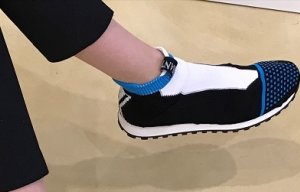
Third millennium shoe offers style, comfort and sustainability
Italian circular knitting machine builder Santoni and its sister company Lonati, the world’s leading hosiery machinery manufacturer, are heading to Moscow this month. The two Brescia based companies will be exhibiting at technical textiles exhibition Techtextil Russia and textile machinery show Inlegmash, which are taking place at Moscow’s Expocenter-Pavilion Forum from 12-14 March (booths FD90 and FD120).

6th March 2012
Innovation in Textiles
|
Brescia
Italian circular knitting machine builder Santoni and its sister company Lonati, the world’s leading hosiery machinery manufacturer, are heading to Moscow this month. The two Brescia based companies will be exhibiting at technical textiles exhibition Techtextil Russia and textile machinery show Inlegmash, which are taking place at Moscow’s Expocenter-Pavilion Forum from 12-14 March (booths FD90 and FD120).
We caught up with Santoni’s Marketing Manager Patrick Silva, who was making preparations for the Russian shows, and asked him to share some of Santoni’s thoughts on seamless knits for technical textiles applications.
“Seamless Technology is an innovative concept in clothing - free of irritating side seams. This technology can directly produce almost finished products, and so reduces the production costs,” Silva commenced.
“Santoni seamless garments are primarily made from a combination of microfibre yarns, elastane and cotton. Microfibre yarns are made up of fine filaments of nylon that produce the softest fabrics. Natural fibres give a smooth look and a soft touch, have reduced pilling and are used in bodysuits, lace, or in jacquard knits.”
“This new seamless apparel has transformed the knitting industry and the overall worldwide production process. The technology is not only replacing traditional knitting but is also replacing anything stitched or with seams,” Silva explained.
“The beauty of these knits is that whilst remaining elegantly stylish, they cover trends from the very chic, the technically-sporty and the casual, to the more practical and basic needs. This very new and original technology is aimed at making knitting accessible and easy to produce as it requires the least possible post knitting labour and services for garments that look very much to the future.”
According to Patrick Silva, Seamless products are being used for a variety of applications as they offer numerous benefits to the user. The technology is forecast to continue growing and apart from current uses Silva says Santoni’s smart seamless knitting technology is playing a prominent role in integrating electronics into materials as a result of its flexibility.
Intimate apparel produced on seamless machines blend comfort, fit and versatility. This, Santoni says, yields high performance, seam-free, easy-care, silky-smooth garments that feel similar to one's second skin and are designed to be worn under today's fluid, lightweight apparel. In a bid to speed up the development of the circular seamless innerwear market, Santoni has introduced a new single jersey machine for the production of swimwear and sanitary garments.
Seamless filament-knit gloves and apparel are available on the market. They are lightweight, flexible and comfortable for workers in the electronics, food-handling, paint, plastics and other high precision business sectors which require high levels of safety in addition to contaminant-free cleanliness.
Santoni says those who desire instant fashion enjoy the versatility and creativity that is in constant evolution.
“Smart fibres or intelligent garments are suited to any occasion. Sophisticated garments capture glamour in motion. Seamless apparel offers both fashion and function for those who want to create their own benchmark for style. Garments produced through seamless technology create comfort during those times when the wearer wants to relax and unwind. Products offer freedom of movement for one's own schedule at one's own pace,” the company says.
Seamless apparel construction focuses on supporting muscles. The development of advanced second-skin textiles has led to renewed interest in seamless garment construction. A diverse range of products such as gloves, hats, and socks are some of the more obvious applications. Swimwear also offers exceptional fit through the use of elastic and quick-drying yarns.
A new seamless heart-sensing controlling sports bra is offered on the market. It is designed to give greater support during high impact sports. Textile electrodes are knitted into the bra and stretch and move with the wearer, maintaining contact with the skin and sensing the heart's electrical pulses. Dr.Rita Paradiso, Ph.D., Research Director of Smartex, Italy, explains:
"Conductivity is the main property being exploited and for our applications, knitted technology is the right one, because we need different domains within the fabric structure with different types of yarns. We have to decide in which places we need to put the conductive yarns and where background yarns are used, because the values of resistance change depending on their position. Of course, we need a garment which fits like a ‘second skin’ because the bio-electrode is in direct contact with the skin.”

According to Santoni the onset of seamless technology in the medical arena has led to advantages for those times when the body needs it most. With the incorporation of high performance fibres and additional sensors or electronics, and the unique combination of fibres which are designed for comfort, the required functions of the garment are achieved.
Patrick Silva explains that other applications include tubular dressings, circular meshes and cuffs for surgery uniforms:
“A light-weight tubular bandage is ideal for dressing retention and for covering the skin in any area of the body. It is manufactured from viscose with very fine elastane threads knitted into the fabric radially and longitudinally to provide a light elasticity. Because of this tubular construction, bandages are particularly suitable for holding dressings in place on difficult areas of the body. The tubular bandages hold dressings securely, without constriction or compression. The light elasticity promotes freedom of movement.”
“One of the most visible examples are the elastic meshes used to secure bandages, compresses and the securing of post-operative implants step-by-step. Meshes are produced on warp knitting machines, with a mixture of polyester yarns/ polyamide and with a recovered elastic count of 90.”
“Advantages over traditional fabrics are: they aid transpiration of the skin so avoiding allergies, they are easy to apply and adapt to any part of the body, and allow more oxygenation of the wound.”
“The tubular rib fabrics of small diameters, due to their compressive effect, are commonly used to close and secure the sleeves of surgery uniforms, optimising their capacity to close and avoid the dispersion of micro-organisms arising from surgery.”
Thanks to continuous investment in technical research Santoni has expanded its range from the production of machines for underwear to the very latest cutting-edge developments for knitwear, medical and sports outerwear.
Garments knitted on Santoni machines merge fashion with functional performance as they allow the production of different stitches such as rib, net, jacquard, piquet, stripes, lace etc., as well as pre-shaped structures such as hidden reinforcement, pockets, collars and hoods.
Santoni claims strong cost savings in terms of manpower, performance, electrical energy usage, fabric stocks and fabric waste are possible when compared with normal production routes.
“Santoni machinery allows the production of a finished garment in just a few minutes starting from the yarn without the need for further cutting and sewing operations,” Patrick Silva concludes.
“Different fibres with different benefits and performance aspects can be combined in one garment giving, mesh areas, opaque areas, creating ventilation areas, comfort zones and variegated compression in the same garment, again, without the need to cut and sew.”

Business intelligence for the fibre, textiles and apparel industries: technologies, innovations, markets, investments, trade policy, sourcing, strategy...
Find out more